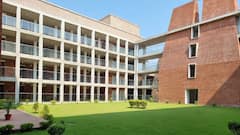Australia's Deakin University To Charge Half The Tuition Fees At India Campus, Will Give Scholarships: VC Martin
EXCLUSIVE INTERVIEW: Focus will be solely on postgraduate education, starting with two programs: Master of Cybersecurity and Master of Business Analytics, says Deakin University VC Prof Iain Martin.

Australia's Deakin University is all set to open its campus in India. It has become the first foreign university to announce the opening of its India campus, after Prime Minister made an announcement to this effect last year. The International Branch Campus (IBC) of Deakin University will come up in GIFT City of Gujarat. The entry criteria will be the same as that for its campuses in Australia, which are a good undergraduate degree, work experience and English language assessment, according to Vice-Chancellor Professor Iain Martin.
In an exclusive interview to ABP Live, Prof Martin spoke at length on aspects ranging from the eligibility criteria and tuition fees to scholarships and placements.
Edited excerpts from the interview conducted over email:
Q: Why is Deakin University focusing only on postgraduate courses?
Prof Iain Martin: Deakin University is focused on offering courses which have a strong industry orientation catering to the demand for a trained workforce in the fin-tech sector at GIFT City. Postgraduate courses in Cybersecurity and Business Analytics will create future-ready professionals who can start delivering professional value upon completion of the course and contributing towards generating economic dividends for India. These are the areas where employers need a skilled workforce.
Deakin will support GIFT City’s aspiration by delivering a supply of job-ready graduates to its target business segments. The USP of the courses offered by Deakin will be “cadetships” — research projects and internships which be available through its partnership with industries. With a growth in demand for such courses Deakin will also scale its operations as GIFT City grows.
For a 360-degree student experience at the undergraduate level which includes a global and multicultural learning and campus experience, studying at the campuses in Australia is more suitable. Postgraduate students on the other hand stand more to gain from professional courses, industry interfacing and employability/job readiness.
Q: What will be the eligibility criteria for admission?
Prof Martin: The entry criteria will be the same as that for our campuses in Australia, which are a good undergraduate degree, work experience and English language assessment. Programmes will be delivered in the same timeline and same trimester structure [February, July and October intake]. This means that a student here who would like to do a trimester of study in Australia could move seamlessly between our campus in Gujarat and one of our five campuses in Australia.
Academic standards will be based on Deakin’s frameworks and manuals and aligned with the national accreditation body in Australia: Tertiary Education Quality and Standards Agency (TEQSA). Courses offered will be identical to what is being offered by Deakin in Australia and are accredited by the Australian Computer Society, a globally recognised professional body.
Q: How will you decide tuition fees? Will it be cheaper than what is charged on Australia campuses?
Prof Martin: The university will start with an intake of 50-60 students and gradually raise that to nearly 100. While the tuition fee is yet to be finalised, it is estimated to be half of what Deakin charges on its campuses in Australia. It gives students who aspire for an international education the opportunity for doing it on their home turf without incurring the cost of moving abroad.
Q: What process will you follow to recruit teachers?
Prof Martin: In terms of faculty, about 80 percent of them will be engaged in India while about 20 percent will be staff who will come from Australia. The engaged faculty from India will be supported to come to Australia once every 12-18 months so that they have a chance to learn from what is happening in Australia but also for the Australian colleagues to learn from what is happening in GIFT City.
The Indian teaching faculty employed at the Deakin University campus in GIFT City will be expected to complete a graduate certificate on teaching and learning methods in higher education, within the first three years of their employment. I want to really emphasise that these will not be a small cohort of staff employed in India, but Deakin staff who happen to be employed in India.
Q: Do you have any scholarship schemes for students?
Prof Martin: Deakin has supported Indian students through scholarships and bursaries, helping over 20,000 individuals realise their study-abroad dreams. The University has also shaped the future of more than 10,000 alumni who are making a significant impact in their respective fields worldwide.
Through the International Branch Campus Deakin will continue doing the same and facilitating students through scholarships is a work in progress currently. Details about the courses, admissions, scholarships and more will be provided within a short while.
Q: What is your vision behind choosing India, or Gujarat, as a destination for your offshore campus?
Prof Martin: Deakin has had a proud history of engagement in India spanning almost three decades with an ‘in India, with India, for India’ approach. In fact, Deakin University was the first foreign university to have set up operations in India. It has been a very immersive and fruitful engagement with students, academic, research, industry and government agencies in India. A sizeable percentage of its international student cohort is from India. Deakin India Research Initiative has been instrumental in promoting collaboration between India and Australia in pivotal research areas through grants and scholarships.
As India’s population is predominantly young, with over 50% below the age of 25, investing in world-class education is crucial not only for the country’s economic growth and development but also for equipping young individuals with the necessary skills and knowledge to flourish in an ever-evolving global landscape. It is a very logical extension of operations for Deakin to find a suitable avenue for opening an International Branch Campus in India.
Additionally, among the factors that enable Deakin to plan a launch as early as next year is the availability of schools, affordable housing, hotels and recreational facilities within GIFT City. The IFSC norms announced last October for foreign campuses that require regulations and standards to be the same as the home campus made the opportunity for Deakin even more attractive.
Q: In terms of work visas, what are the opportunities available for students?
Prof Martin: While students finishing their postgraduate degree from Deakin’s campus in GIFT City will not have the benefit of a post-study work visa (which is available only to students who study in Australia for a period of two years), there will be some advantages while seeking a job opportunity overseas. Students can seek work visas as skilled migrants.
Q: Do you have any placement plan or strategy in place for students graduating from your India campus?
Prof Martin: Deakin University’s International Branch Campus in GIFT is at a location which has the strategic advantage of being populated by some of the top global financial and insurance firms where the students can be absorbed into the digital economy. Deakin counts among its partners HSBC, Infosys, TCS, Xebia and HCL. Students will be trained alongside these partners and will serve as a valuable manpower resource.
Education Loan Information:
Calculate Education Loan EMI
Related Video
Delhi Election Results 2025: Counting Begins; BJP Poised for Historic Comeback in Delhi, Exit Polls Suggest | ABP News
Top Headlines





































